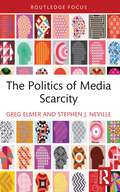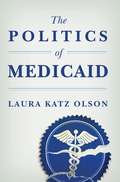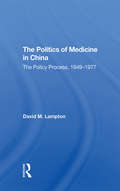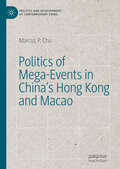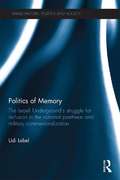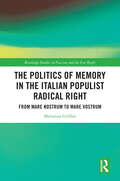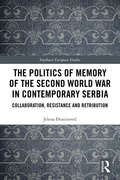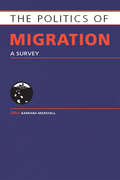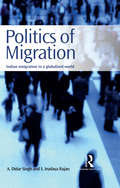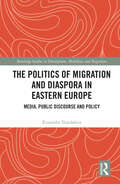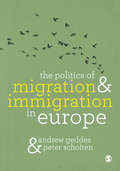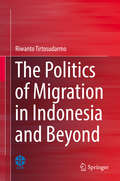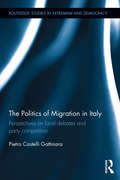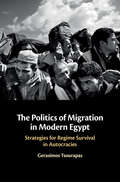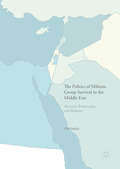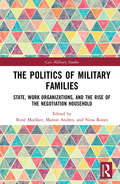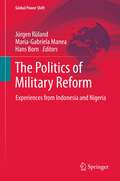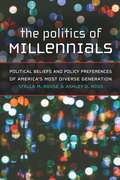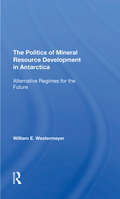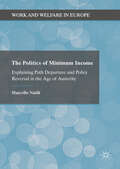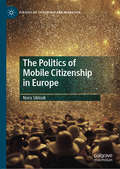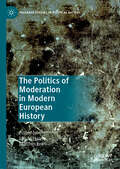- Table View
- List View
The Politics of Media Scarcity (Routledge Focus on Media and Cultural Studies)
by Greg Elmer Stephen J. NevilleThis book questions the predominance of “media abundance” as a guiding concept for contemporary mediated politics. The authors argue that media abundance is not a universal condition, and that certain individuals, communities, and even nations can more accurately be referred to as media scarce – where access to media technologies and content is limited, highly controlled, or surveilled.Through case studies that focus on guerilla militants, incarcerated Indigenous people, and cold war‑era infrastructure, including Soviet “closed” or “secret” cities and Canadian nuclear bunkers, the book’s chapters interrogate how the once media scarce later “speak” to – and can be heard by – the predominant, abundant media culture. Drawing from several art projects and diverse cultural sites, the book highlights how media scarce communities negotiate and otherwise narrate their place in the world, their past experiences and lives, and escape from subjugation. To better understand media scarce politics, the book asks how and when communities become – by accident or force, by choice or necessity – media scarce.This innovative and insightful text will appeal to students and scholars around the world working in the areas of media and politics, art and politics, visual studies, surveillance studies, and communication studies.
The Politics of Medicaid
by Laura Katz OlsonIn 1965, the United States government enacted legislation to provide low-income individuals with quality health care and related services. Initially viewed as the friendless stepchild of Medicare, Medicaid has grown exponentially since its inception, becoming a formidable force of its own. Funded jointly by the national government and each of the fifty states, the program is now the fourth most expensive item in the federal budget and the second largest category of spending for almost every state. Now, under the new, historic health care reform legislation, Medicaid is scheduled to include sixteen million more people.Laura Katz Olson, an expert on health, aging, and long-term care policy, unravels the multifaceted and perplexing puzzle of Medicaid with respect to those who invest in and benefit from the program. Assessing the social, political, and economic dynamics that have shaped Medicaid for almost half a century, she helps readers of all backgrounds understand the entrenched and powerful interests woven into the system that have been instrumental in swelling costs and holding elected officials hostage. Addressing such fundamental questions as whether patients receive good care and whether Medicaid meets the needs of the low-income population it is supposed to serve, Olson evaluates the extent to which the program is an appropriate foundation for health care reform.
The Politics of Medicine in China: The Policy Process 1949-1977
by David M LamptonThis book examines and explains changes in Chinese health care policy during the 1949-1977 period. It is concerned with analyzing the reasons for policy change and deriving a coherent view of the Chinese political process from that analysis.
Politics of Mega-Events in China's Hong Kong and Macao (Politics and Development of Contemporary China)
by Marcus P. ChuThis book explores the connection between politics and mega-events in post-handover Hong Kong and Macao. It also offers an in-depth account of the two cities’ keenness to integrate with China and engage in the international society and China’s eagerness to build image, boost influence and gain respect on the global arena. This work will facilitate academics, think tanks, diplomats and government officials to further understand the politics and international relations of China, Hong Kong and Macao.
A Politics of Melancholia: From Plato to Arendt
by George Edmondson Klaus MladekWhy melancholia is a vital form of social critique and a catalyst for political renewalMelancholia is wrongly condemned as a condition of withdrawal and despair that alienates its sufferer from community. Countering that misconception, A Politics of Melancholia reclaims an understanding of melancholia not as an affliction in need of a remedy but as an affirmative stance toward decay and ruination in political life, and restores the melancholic figure—by turns inventive and destructive, outraged and inspired—to their rightful place as the poet of political thought.George Edmondson and Klaus Mladek identify pivotal moments of political melancholia in ancient and modern texts, offering new perspectives on the death of Socrates in Plato&’s dialogues, the fratricide in Hamlet, Woyzeck&’s killing of Marie in Georg Büchner&’s Woyzeck, the murder of Moses in Freud&’s thought, and the betrayal of the revolutionary idea that Hannah Arendt identifies in her critique of eighteenth-century revolutions. Melancholia emerges here as a disposition that is mournful but also jubilant, a mood of unbending disconsolation that remains faithful to a scene of downfall, to events that cannot be forgotten, and to things that cannot be governed.Recovering a tradition of thought that is both affirmative and hopeful, this eloquent book reveals how political melancholia embodies a shared condition of discontent that binds communities together and inspires change.
Politics of Memory: The Israeli Underground's Struggle for Inclusion in the National Pantheon and Military Commemoralization (Israeli History, Politics and Society)
by Udi LebelThis book illustrates how a dominant political party, the Mapai, under the leadership of P.M. David Ben-Gurion, chose to ‘hug,’ honor and commemorate ‘Her Fallen’ and ‘Her Bereaved Families,’ whilst simultaneously ignoring the fallen that were identified with the rival political party, Herut, led by Menachem Begin. Designing legislation and cultural policy designated for Teaching the public that those who sacrificed themselves in the Israeli War of Independence – were Hagana Members, one of three Israeli undergrounds movements, associated with Mapai specific ideological viewpoint. By that - the Israeli state created political legitimacy and dominance for Mapai – which was framed as the only political party which were involved with the struggle for national independence. "Her" fighters, battles and casualties became part of the collective memory and national ethos. This project was implemented by refusing to acknowledge "the Other" casualties of the Eztel and Lehi underground movements wich were ideological identified with Herut Party. The state excluded their bereaved families from the wider official military bereavement circle and forced them to experience "disenfranchised grief", With no access to official commemoration or to rehabilitative support. It was only after the Likud's (ex-Herut) victory in the 1977 elections that enabled P.M. Menachem Begin to correct this "exile from national identity" and to initiate the inclusion of "His" fighters and casualties to the military cemeteries, to the history books and to the state commemorations, as recognizing their families as part of the National Military Bereavement circles entitled to Honors and support. A thought provoking study about the dark side of the Israeli nation building era, Politics of Memory explores the politics of historiography, bereavement and military commemoration, and the confrontation over boundaries of national pantheon, examining the effects of these factors on Israeli national identity and politics. With introductions by Moshe Arens, former Israeli Minister of Defense and Minister for Foreign Affairs, and by Yehiel Kadishai, P.M. Menachem Begin’s chief of staff, this book will be of interest to students and scholars of Israeli history; military studies; memory and heritage studies; the study of loss and bereavement, and politics in general.
The Politics of Memory in the Italian Populist Radical Right: From Mare Nostrum to Mare Vostrum (Routledge Studies in Fascism and the Far Right)
by Marianna GriffiniThe Politics of Memory in the Italian Populist Radical Right examines the role of colonial memory in the contemporary Italian populist radical right, which includes the Lega and Fratelli d’Italia (FdI). The book originally adopts postcolonialism as an analytical framework to critically examine which roles colonial memory plays in the Italian populist radical right. Considering the timeframe between 2013 and 2021, this book suggests that the contemporary Italian populist radical right selectively shaped its memory of the colonial past, expunging the most difficult aspects from it. The fact that the Italian populist radical right parties examined do not fully acknowledge the controversial aspects of Italy’s colonial past, which are bracketed off discourse, may contribute to the deployment of colonial discourse by these same parties when discussing immigration. From this Italian case study, broader implications can be drawn regarding the role of colonial memory in political discourse, which is a topical matter across Europe. The book will be of interest to those studying populism, the radical right, Italian politics and history, colonialism, and the politics of memory.
The Politics of Memory of the Second World War in Contemporary Serbia: Collaboration, Resistance and Retribution (Southeast European Studies)
by Jelena ĐureinovićExploring the concepts of collaboration, resistance, and postwar retribution and focusing on the Chetnik movement, this book analyses the politics of memory. Since the overthrow of Slobodan Milošević in 2000, memory politics in Serbia has undergone drastic changes in the way in which the Second World War and its aftermath is understood and interpreted. The glorification and romanticisation of the Yugoslav Army in the Homeland, more commonly referred to as the Chetnik movement, has become the central theme of Serbia’s memory politics during this period. The book traces their construction as a national antifascist movement equal to the communist-led Partisans and as victims of communism, showing the parallel justification and denial of their wartime activities of collaboration and mass atrocities. The multifaceted approach of this book combines a diachronic perspective that illuminates the continuities and ruptures of narratives, actors and practices, with in-depth analysis of contemporary Serbia, rooted in ethnographic fieldwork and exploring multiple levels of memory work and their interactions. It will appeal to students and academics working on contemporary history of the region, memory studies, sociology, public history, transitional justice, human rights and Southeast and East European Studies.
Politics of Migration: A Survey
by Barbara MarshallThis new collection includes essays covering specific themes in the field of migration and geographic overviews, written by a variety of academics and experts. It also contains key maps and a glossary covering up-to-date issues in the field of migration, including theories, issues, countries, national and international organizations and personalities.
Politics of Migration: Indian Emigration in a Globalized World
by S. Irudaya Rajan A. Didar SinghThis book studies the politics surrounding Indian emigration from the 19th century to the present day. Bringing together data and case studies from across five continents, it moves beyond economic and social movers of migration, and explores the role of politics—both local and global—in shaping diaspora at a deeper level. The work will be invaluable to scholars and students of migration and diaspora studies, development studies, international politics, and sociology as well as policy-makers, and non-governmental organizations in the field.
The Politics of Migration and Diaspora in Eastern Europe: Media, Public Discourse and Policy (Routledge Studies in Development, Mobilities and Migration)
by Ruxandra TrandafoiuThis book provides a critical analysis of the politics of migration in Eastern Europe and an in-depth understanding of the role played by media and public discourse in shaping migration and migration policy. Ruxandra Trandafoiu looks at emigration, diaspora, return, kin-minority cross-border mobility, and immigration in Eastern Europe from cultural, social and political angles, tracing the evolution of migration policies across Eastern Europe through communication, public debate and political strategy. Trandafoiu investigates the extent to which these potential ‘models’ or policy practices can be comparable to those in Western European countries, or whether Eastern Europe can give rise to a migration ‘system’ that rivals the North American one. Each chapter bridges the link between policy and politics and makes a case for considering migration politics as fundamentally intertwined with media representation and public debate. Drawing on comparative case studies of countries including Bulgaria, Croatia, Estonia, Hungary, Poland, Romania, Slovakia and Ukraine, the book considers how migration is both managed and experienced from political, social and cultural viewpoints and from the perspectives of a range of actors including migrants, politicians, policymakers and journalists. This book will be key reading for advanced students and researchers of migration, media, international relations, and political communication.
The Politics of Migration and Immigration in Europe
by Andrew Geddes Dr Peter ScholtenMigration and immigration are high on any nation's agenda but have particular resonance in Europe in light of recent events. The new edition of this book has been fully updated in this respect and explores: Immigration policy in individual EU nations The treatment of migrants, including immigrant policies The development and effects of the Shengen agreement The movement towards common EU policies. It looks specifically at the contexts of Britain, France, Germany, The Netherlands, Sweden, Italy, Spain, Greece and Turkey as well as a examining the changing nature of migration dynamics in central and Eastern Europe. This book is a significant and timely analysis suitable for students of migration at any level.
The Politics of Migration and Immigration in Europe
by Andrew Geddes Dr Peter ScholtenMigration and immigration are high on any nation’s agenda but have particular resonance in Europe in light of recent events. The new edition of this book has been fully updated in this respect and explores: Immigration policy in individual EU nations The treatment of migrants, including immigrant policies The development and effects of the Shengen agreement The movement towards common EU policies. It looks specifically at the contexts of Britain, France, Germany, The Netherlands, Sweden, Italy, Spain, Greece and Turkey as well as a examining the changing nature of migration dynamics in central and Eastern Europe. This book is a significant and timely analysis suitable for students of migration at any level.
The Politics of Migration in Indonesia and Beyond
by Riwanto TirtosudarmoThis book examines the social and political dimensions of migration from a perspective between the realms of demography and politics. It approaches the issue of migration by highlighting the important power relations that have previously been neglected in studies in the area. The book starts by investigating Indonesian migration to provide an understanding of internal migration. It then looks beyond its national borders for a wider understanding of Asia, and showcases several case studies both in Indonesia and beyond to illustrate the intricate politics of migration. Further, it considers the politics of migration from the sending country perspective and unravels the link between migration and security. The book provides reviews of the wider literature relating to population mobility and distribution, and shows readers how to adopt a new perspective in the study of movement of people –an issue that is becoming increasingly important as movement of people unfolds globally in terms of both volume and direction. This book is a valuable resource for students, academics and researchers in the area of demography and social-politics, especially those interested in migration and refugees. It also offers insights for those interested in understanding decentralization in greater depth.
The Politics of Migration in Italy: Perspectives on local debates and party competition (Extremism and Democracy)
by Pietro Castelli GattinaraMigration represents one of the key issues in both Italian and European politics, and it has triggered EU-wide debates and negotiations, alongside alarmist and often sensationalist news reporting on the activities of government, party and social movement actors. The Politics of Migration in Italy explores what happens when previously undiscussed issues become central to political agendas and are publicly debated in the mass media. Examining how political actors engage with the issue of migration in electoral campaigning, this book highlights how complex policy issues are addressed selectively by political entrepreneurs and how the responses of political actors are influenced by strategic incentives and ongoing events. This book studies the dynamics of the politicization of the immigration issue across three local contexts in Italy – Prato, Milan and Rome – which differ systematically with respect to crucial economic, cultural and security dimensions of immigration. Offering an innovative exploration of party competition and migration in Italy, as well as providing the conceptual and analytical tools to understand how these dynamics play out beyond the Italian case, this book is essential reading for students, scholars and policymakers working in the areas of migration studies, agenda-setting and European politics more generally.
The Politics of Migration in Modern Egypt: Strategies for Regime Survival in Autocracies
by Gerasimos TsourapasIn this ground-breaking work, Gerasimos Tsourapas examines how migration and political power are inextricably linked, and enhances our understanding of how authoritarian regimes rely on labour emigration across the Middle East and the Global South. Dr Tsourapas identifies how autocracies develop strategies to tie cross-border mobility to their own survival, highlighting domestic political struggles and the shifting regional and international landscape. In Egypt, the ruling elite has long shaped labour emigration policy in accordance with internal and external tactics aimed at regime survival. Dr Tsourapas draws on a wealth of previously-unavailable archival sources in Arabic and English, as well as extensive original interviews with Egyptian elites and policy-makers in order to produce a novel account of authoritarian politics in the Arab world. The book offers a new insight into the evolution and political rationale behind regime strategies towards migration, from Gamal Abdel Nasser's 1952 Revolution to the 2011 Arab Uprisings.
The Politics of Militant Group Survival in the Middle East
by Ora SzekelyThis book compares the performances of four key non-state actors in the Arab-Israeli conflict ecosystem: the PLO, Hamas, Hizbullah, and Amal. It argues that it is not the assets a militant group has, but rather how it acquired them that matters in explaining the variation in these actors' abilities to militarily resist and politically recover from confrontations with far more powerful adversaries. Groups that rely on marketing campaigns to secure local support and regional patronage do far better than those that rely on coercion or even barter. The book develops a typology of organizations based on their foreign and domestic policies, which has interesting implications for other non-state actors, such as ISIS. It is based on field research in Jordan, Lebanon, Israel, the West Bank, Egypt, and Syria, including interviews with members of a range of Lebanese and Palestinian militant groups, as well as politicians, UN staff, journalists, and members of the Jordanian and Israeli armies.
The Politics of Military Families: State, Work Organizations, and the Rise of the Negotiation Household (Cass Military Studies)
by René Moelker Manon Andres Nina RonesThis book examines the politics of military families in relation to the tensions between the state, military organization, and private life. It elaborates on the tensions between the advent of challenging worldwide deployment for the military and the prominence of the home front. The volume aims to understand the dynamics of conflict and change within triad figurations at the macro (society), meso (organizational), and micro (family) level and is guided by the following overarching research questions: What are the key issues in the three-party dynamics? What tensions exist in these dynamics? How do actors seek to arrive at a balance? What initiatives for change are made? With contributions from international scholars, who examine the workings of politics in military families at all three levels, the book argues that members within military families deal with shifting power balances and these are impacted by demands from organizations and the state. This book will be of much interest to students of military studies, sociology, organizational studies and politics.
The Politics of Military Force: Antimilitarism, Ideational Change, and Post-Cold War German Security Discourse (Configurations: Critical Studies Of World Politics)
by Frank StengelThe Politics of Military Force examines the dynamics of discursive change that made participation in military operations possible against the background of German antimilitarist culture. Once considered a strict taboo, so-called out-of-area operations have now become widely considered by German policymakers to be without alternative. The book argues that an understanding of how certain policies are made possible (in this case, military operations abroad and force transformation), one needs to focus on processes of discursive change that result in different policy options appearing rational, appropriate, feasible, or even self-evident. Drawing on Essex School discourse theory, the book develops a theoretical framework to understand how discursive change works, and elaborates on how discursive change makes once unthinkable policy options not only acceptable but even without alternative. Based on a detailed discourse analysis of more than 25 years of German parliamentary debates, The Politics of Military Force provides an explanation for: (1) the emergence of a new hegemonic discourse in German security policy after the end of the Cold War (discursive change), (2) the rearticulation of German antimilitarism in the process (ideational change/norm erosion) and (3) the resulting making-possible of military operations and force transformation (policy change). In doing so, the book also demonstrates the added value of a poststructuralist approach compared to the naive realism and linear conceptions of norm change so prominent in the study of German foreign policy and International Relations more generally.
The Politics of Military Reform
by Hans Born Jürgen Rüland Maria-Gabriela ManeaThis volume seeks to explain why democratization and military reforms stagnate in newly democratizing countries. The contributions blend historical, ideational, cultural and structural explanatory factors to analyze the trajectories of military reform in Indonesia and Nigeria, two major regional powers that share many structural commonalities. In the tradition of the literature on security sector reform (SSR), the book not only scrutinizes executive initiatives toward military reform, but also provides ample coverage of societal actors. Findings show that while military reform is stagnating in both countries, societal forces ought to be taken into account more as major driving forces in explaining military reform. Several chapters study how legislatures, non-governmental organizations and the civilian defence epistemic community contribute to the transformation of military institutions. The last part of the book tackles another aspect rarely studied in the literature on military reform, namely, the role of militias in military reform.
The Politics of Millennials: Political Beliefs and Policy Preferences of America's Most Diverse Generation
by Stella M Rouse Ashley D RossToday the Millennial generation, the cohort born from the early 1980s to the late 1990s, is the largest generation in the United States. It exceeds one-quarter of the population and is the most diverse generation in U.S. history. Millennials grew up experiencing September 11, the global proliferation of the Internet and of smart phones, and the worst economic recession since the Great Depression of the 1930s. Their young adulthood has been marked by rates of unemployment and underemployment surpassing those of their parents and grandparents, making them the first generation in the modern era to have higher rates of poverty than their predecessors at the same age. The Politics of Millennials explores the factors that shape the Millennial generation’s unique political identity, how this identity conditions political choices, and how this cohort’s diversity informs political attitudes and beliefs. Few scholars have empirically identified and studied the political attitudes and policy preferences of Millennials, despite the size and influence of this generation. This book explores politics from a generational perspective, first, and then combines this with other group identities that include race and ethnicity to bring a new perspective to how we examine identity politics.
The Politics Of Mineral Resource Development In Antarctica: Alternative Regimes For The Future
by William E WestermeyerOriginally published in 1984. Antarctica can no longer be considered merely a highly specialized area of interest to a relative handful of explorers and scientists. World political leaders who, in an era of resource politics, are looking to potential sources of supplies of living and non-living resources. Antarctica may prove to be a source of such supplies. In this volume, Dr. Westermeyer’s study of the options available for a mineral regime and probable costs comes at an opportune time, helping participants understand the issues and find acceptable solutions.
The Politics of Minimum Income: Explaining Path Departure And Policy Reversal In The Age Of Austerity (Work And Welfare In Europe Ser.)
by Marcello NatiliMinimum income schemes (MIS) have become key social protection institutions for European citizens, but we know little regarding the logic and dynamics of institutional change in this policy field. This book provides an analytical model that will facilitate an understanding of the scope and direction of recent reforms, offering insight into the conditions under which minimum income schemes are introduced, expanded or retrenched. Natili presents a comparative analysis of policy trajectories of minimum income schemes in Italy and Spain between the mid-1980s and 2015. Although these two countries had similar points of departure, and faced comparable functional pressures and institutional constraints, they experienced remarkably different developments in this policy field in the last two decades. This comparative analysis provides empirical evidence of the impacts of different types of credit-claiming dynamics resulting from the interaction of socio-political demand with political supply. The Politics of Minimum Income also assesses the reform processes both in countries that have introduced MIS in the age of austerity (such as Portugal) and in countries that have retrenched them (Austria and Denmark).
The Politics of Mobile Citizenship in Europe (Politics of Citizenship and Migration)
by Nora SiklodiThe Politics of Mobile Citizenship in Europe explores contemporary models of national and European Union (EU) citizenship in the context of intra-EU mobility. Scholars have often addressed these models from separate disciplinary standpoints. National citizenship has been studied through the prism of citizenship studies and EU citizenship from an EU studies viewpoint. To contribute to their ongoing discussion and offer a politically embedded perspective, Siklodi applies the citizenship studies lens to the analysis of EU-wide survey data and original focus group evidence of young and highly educated EU mobiles and stayers in Sweden and Britain. Specifically, she investigates political community building processes, including processes of differentiation and exclusion, and the dimensions of citizenship – identity, rights and participation – at the national and EU levels. Siklodi proposes a redefinition of the active/passive citizen dichotomy in terms of mobiles/stayers to provide a more accurate description of contemporary citizen attitudes and behaviours across the European community.
The Politics of Moderation in Modern European History (Palgrave Studies in Political History)
by Ido De Haan Matthijs LokThis book charts the varieties of political moderation in modern European history from the French Revolution to the present day. It explores the attempts to find a middle way between ideological extremes, from the nineteenth-century Juste Milieu and balance of power, via the Third Ways between capitalism and socialism, to the current calls for moderation beyond populism and religious radicalism. The essays in this volume are inspired by the widely-recognized need for a more nuanced political discourse. The contributors demonstrate how the history of modern politics offers a range of experiences and examples of the search for a middle way that can help us to navigate the tensions of the current political climate. At the same time, the volume offers a diagnosis of the problems and pitfalls of Third Ways, of finding the middle between extremes, and of the weaknesses of the moderate point of view.
